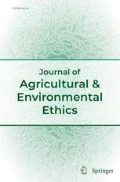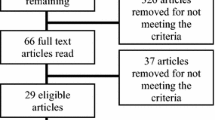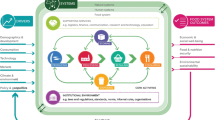Abstract
This paper argues that the definition of food justice must be defined in more participatory terms. Current accounts of food justice tend to emphasize distributional inequalities. However, there is broad recognition that these distributional inequalities are the result of participative inequalities and that the participation of marginalized groups in advocacy plays an important role in creating just food systems. In addition, thinking of food justice in more participative terms also suggests a more well-rounded and comprehensive approach to dealing with inequalities within the food system. One manner in which the concept of food justice can be redefined to better capture the importance of participative justice is by considering what is required for informed consent.
Similar content being viewed by others
Notes
It is worth noting that the maldistributions being considered in this paper all occur within the American context. This should not be taken to suggest that participative justice is only important in the American context. Indeed, it is important globally. I focus only on the American context because Gottlieb and Joshi (2010), and the authors contributing to Alkon and Agyeman’s (2011a) (the two sources I am drawing examples from) pay more attention to the American than the international context.
Some might argue at this point that, while food justice tends to be understood in terms of distribution, there is an extensive literature regarding food sovereignty (see Holt-Gimenez 2011; Wittman et al. 2010; Holt-Gimenez et al. 2009; Patel 2007 for some examples). This literature on food sovereignty quite clearly recognizes, and indeed emphasizes, the importance of the participation of historically marginalized food workers, smallholder farmers, and others who have been excluded as means of addressing inequalities within the food system. However, this does not eliminate the need for greater recognition of the importance of more, and more inclusive, participation for food justice. This is because food justice, as both a concept and a movement, is broader than food sovereignty. What I mean by the above claim is that advocates of food sovereignty are advocates of a very specific sort of radical re-orienting of food systems that involves eliminating agribusiness in favor of more local and democratic control of the growing and distribution of food. The food justice movement, on the other hand, is broader. Rather than calling for a specific approach to reorganization of food systems in the manner of the food sovereignty movement, those concerned with food justice are more concerned with broad questions regarding a range of inequalities within the food system and exploring a range of possible approaches for addressing those inequalities. Thus being so, while I applaud proponents of food sovereignty for appreciating the importance of participation and laud their goal of developing a more democratic food system, I contend that the both food justice scholarship and the food justice movement must be more careful to consider the importance of participation in decision-making in regards to distributive inequalities.
It should be made clear that while this paper focuses on individuals belonging to a handful of groups—including farmers, farm workers, those living in rural areas or areas with lower average incomes, and individuals of color—I do not intend to suggest that only these individuals are excluded from fully participating in food systems. Rather the emphasis on the above-listed is simply an artifact of the literature that this paper is responding to. I am only mirroring the authors that I am responding to. Indeed, it may be worth noting that, if my arguments in the remainder of this paper are correct, it may be that a fairly broad swathe of the population should be recognized as not being fairly included in decisions affecting their food systems.
A common trope—particularly in the popular literature regarding food—is that a large portion of the population has relatively limited awareness regarding agriculture, food processing, the distances and manner in which their food is shipped, the nutritional value of their food, and a host of other matters that are relevant to their choices regarding food. If such literature is correct then it might be said that many are not in a position to give informed consent in regards to their food systems. As I will suggest later, informed consent is the minimum that would be required for just participation.
The above being noted, given that the goal of this paper is just to demonstrate that even their own work suggests that the definitions of food justice offered by Alkon, Agyeman, Gottlieb, and Joshi do not adequately recognize the importance of participation, I will not discuss the potentially much broader range of participative injustices further.
While I focus on farm workers, many others such as farmers, slaughterhouse employees, truck drivers, restaurant workers, and those employed within food related industries also pay the cost for the cheap readily available food that many Americans enjoy.
It should be noted that while all food products were less likely to be available in low-income communities and communities of color, the gap was widest in regards to fresh fruit and vegetables. The gap between the availability of “junk foods” was much smaller; often with only single digit differences in the percentage of stores carrying them.
Because without consent it would seem that whatever actions one takes or decisions one makes would be taken or made under coercion and it seems rather strange to accept coerced actions or decisions as legitimate cases of participation.
Given that there is an extensive body of literature on the previously listed condition for consent I will not explain them in detail here. I will simply consider how they may be applicable for redefining food justice.
References
Alkon, A. H., & Agyeman, J. (2011a). Cultivating food justice: Race, class, and sustainability. Cambridge, MA: MIT Press.
Alkon, A. H., & Agyeman, J. (2011b). Introduction: The food movement as polyculture. In A. H. Alkon & J. Agyeman (Eds.), Cultivating food justice: Race, class, and sustainability (pp. 1–20). Cambridge, MA: MIT Press.
Allen, P. (2010). Realizing justice in local food systems. Cambridge Journal of Regions, Economy and Society, 3, 295–308.
Brown, S., & Getz, C. (2011). Farmworker food insecurity and the production of hunger in California. In A. H. Alkon & J. Agyeman (Eds.), Cultivating food justice: Race, class, and sustainability (pp. 121–146). Cambridge, MA: MIT Press.
Centers for Disease Control and Prevention. (2013). Nutrition for everyone: Fruits and vegetables. Centers for Disease Control and Prevention. http://www.cdc.gov/nutrition/everyone/fruitsvegetables/index.html Accessed June 19, 2013.
Community Alliance for Global Justice. (2013) Food justice project. Community Alliance for Global Justice. http://www.seattleglobaljustice.org/food-justice/ Accessed June 3, 2013.
Elliott, K. (2011). Is a little pollution good for you? Incorporating societal values in environmental research. Oxford: Oxford University Press.
Fraser, N. (2000). Rethinking recognition. New Left Review, 3, 107–120.
Gottlieb, R., & Joshi, A. (2010). Food justice. Cambridge, MA: MIT Press.
Holt-Gimenez, E. (2011). Food movements unite!. Oakland, CA: Food First Books.
Holt-Gimenez, E., Patel, R., & Shattuck, A. (2009). Food rebellions! Crisis and the hunger for justice. Oakland, CA: Food First Books.
Just Food. (2010). Food justice. Just Food. http://www.justfood.org/food-justice Accessed June 3, 2013.
Lang, T., & Heasman, M. (2004). Food wars: The global battle for mouths, minds, and markets. London: Earthscan.
McClintock, N. (2011). From industrial garden to food desert: Demarcated devaluation in the flatlands of Oakland, California. In A. H. Alkon & J. Agyeman (Eds.), Cultivating food justice: Race, class, and sustainability (pp. 89–120). Cambridge, MA: MIT Press.
McEntee, J. C. (2011). Realizing rural food justice: Divergent locals in the northeastern United States. In A. H. Alkon & J. Agyeman (Eds.), Cultivating food justice: Race, class, and sustainability (pp. 239–259). Cambridge, MA: MIT Press.
Ornelas, L. (2010). Shining a light on the valley of heart’s delight: Taking a look at access to healthy foods in Santa Clara county’s communities of color and low-income communities. San Jose, CA: Food Empowerment Project.
Patel, R. (2007). Stuffed and starved: The hidden battle for the world food system. Brooklyn, NY: Melville House.
Schlosberg, D. (2004). Reconceiving environmental justice: Global movements and political theories. Environmental Politics, 13, 517–540.
Shrader-Frechette, K. (2002). Environmental justice: Creating equality, reclaiming democracy. Oxford: Oxford University Press.
United States Department of Agriculture. (1999). Food cost review 1950–97. Washington, DC: Government Printing Office.
United States Department of Agriculture. (2005). The 20th century transformation of US agriculture and farm policy. Washington, DC: Government Printing Office.
United States Department of State. (2013). Trafficking in Persons Report 2013. Washington, DC: Government Printing Office.
Wittman, H., Desmarais, A. A., & Wiebe, N. (2010). Food sovereignty: Reconnecting food, nature, and community. Oakland, CA: Food First Books.
Young, I. M. (1990). Justice and the politics of difference. Princeton, NJ: Princeton University Press.
Author information
Authors and Affiliations
Corresponding author
Rights and permissions
About this article
Cite this article
Loo, C. Towards a More Participative Definition of Food Justice. J Agric Environ Ethics 27, 787–809 (2014). https://doi.org/10.1007/s10806-014-9490-2
Accepted:
Published:
Issue Date:
DOI: https://doi.org/10.1007/s10806-014-9490-2




